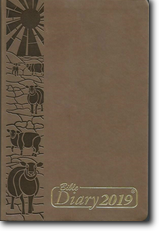Gospel: Mark 4:26-34
Jesus also said, “In the kingdom of God it is like this: a man scatters seed upon the soil. Whether he is asleep or awake, be it day or night, the seed sprouts and grows; he knows not how. The soil produces of itself; first, the blade; then, the ear; then the full grain in the ear. And when it is ripe for harvesting, they take the sickle for the cutting: the time for the harvest has come.”
Jesus also said, “What is the kingdom of God like? To what shall we compare it? It is like a mustard seed which, when sown, is the smallest of all the seeds scattered upon the soil. But once sown, it grows up and becomes the largest of the plants in the garden; and even grows branches so big, that the birds of the air can take shelter in its shade.”
Jesus used many such stories, in order to proclaim the word to them in a way that they would be able to understand. He would not teach them without parables; but privately, to his disciples, he explained everything.
Reflections
“It is like a mustard seed which, when sown, is the smallest of all the seeds scattered upon the soil.”
We often measure our success by grand achievements and quantifiable results. But the gospel applies a different standard. As Jesus observes, that measure is better taken from nature: the quiet miracle that transforms seeds into a ripened crop; the mystery that produces from the smallest mustard seed the largest plant in the garden. How do we measure our effectiveness? The results are not in our own control; perhaps another generation will reap. It is given to us to be faithful to our mission, to scatter the seeds. Meanwhile, the power of the gospel operates in secret, whether we are awake or asleep—perhaps to bear fruit in a form we may never foresee or comprehend. Pope Francis has referred to this strategy for change when he speaks of simply setting processes in motion. As he often likes to say, time is more powerful than spaces: “We must not focus on occupying the spaces where power is exercised, but rather on starting longrun historical processes... God manifests himself in time and is present in the processes of history... It requires patience, waiting.”
Daily Reflection 2019
Bible Diary ® is a product of Claretian Publications, a division of Claretian Communications Foundation, Inc. (CCFI) which is a pastoral endeavor of the Claretian Missionaries in the Philippines that brings the Word of God to people from all walks of life. CCFI aims to promote integral evangelization and renewed spirituality that is geared towards empowerment and total liberation in response to the needs and challenges of the Church today.
CCFI is a member of Claret Publishing Group, a consortium of the publishing houses of the Claretian Missionaries all over the world: Bangalore, Barcelona, Buenos Aires, Chennai, Colombo, Dar es Salaam, Lagos, Madrid, Macao, Manila, Owerry, São Paolo, Varsaw , Yaoundé.
Biblical Texts are taken from Christian Community Bible, Catholic Pastoral Edition (57th Edition) The New English Translation for the ROMAN MISSAL
With permission from the EPISCOPAL COMMISION ON LITURGY of the Catholic Bishops’ Conference of the Philippines
Copyright © 2O17
Claretian Communications Foundation, Inc.
U.P. P.O. Box 4, Diliman,
1101 Quezon City, Philippines
Tel.: (63-2) 921-3984
Fax: (6352) 921-7429
Email: ccfi@claretianpublicationscom
This email address is being protected from spambots. You need JavaScript enabled to view it.
Web: www.claretianph.com


